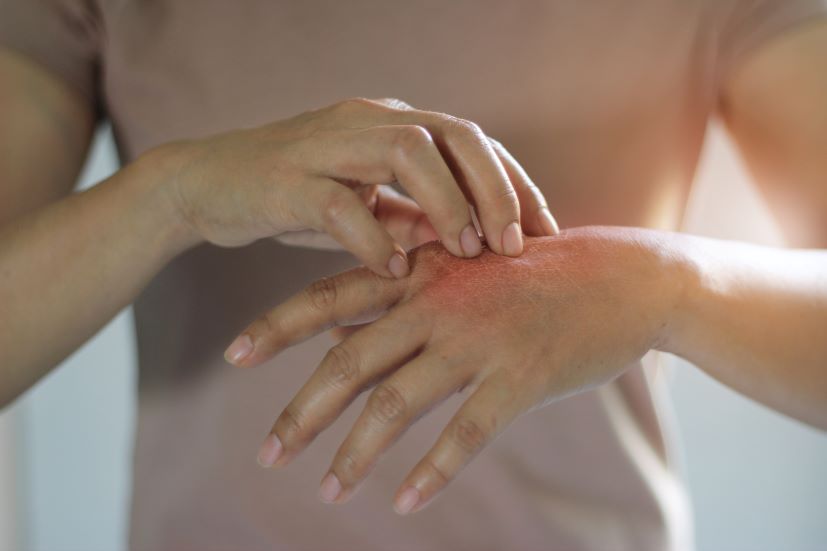Teenage skin can be super sensitive and need some ultra care, since puberty hits right around that age. Teenage skin…

 Healthy Skin
Healthy Skin
New Psoriasis Flare: Things to Consider Before Going to the Pharmacy
What is Psoriasis?
Psoriasis is an autoimmune disease that causes raised, red, scaly patches to appear on the skin. It can affect any part of the body but typically appears behind elbows and knees, scalp, back, face, hands, and feet. When plaque psoriasis starts, it will just look like a few red patches on your skin. Then they will start to get bigger and thicker on the skin. The patches can eventually crack, bleed, and get very itchy. Without treatment, psoriasis flare-ups can last for weeks or even months.
Psoriasis Statistics:
How prevalent is Psoriasis?
- More than 8 million Americans have psoriasis.
- 125 million people worldwide have psoriasis
Age Onset
- Psoriasis often appears between the ages of 15 and 25 (but you can develop it at any age)
Triggers
Psoriasis symptoms can be caused by environmental factors including:
-
- Infections (strep throat or skin infections)
- Cold, dry climates
- Skin injuries (cuts, scrapes, sunburn)
- Stress
- Smoking
- Alcohol
- Certain medications blood pressure meds, lithium, and antimalarial drugs)
Severity of Psoriasis
- The National Psoriasis Foundation defines moderate psoriasis as affecting 3-10% of the skin; and more than 10% is considered severe.
- Nearly one-quarter of people with psoriasis have cases that are considered moderate to severe.
Psoriasis Treatment:
Although there is no way to cure psoriasis completely, most patients find success with home remedies, OTC products, or prescription products that treat flare-ups.
If you are struggling with moderate psoriasis, consider purchasing OTC products or home remedies before heading straight to your dermatologist. Look for topical products that contain: salicylic acid, coal tar, or steroids as these ingredients directly target the scaly patches. Other natural ingredients that you can try as a topical treatment are: aloe vera, Epsom salts, jojoba oil, zinc pyrithione, and capsaicin.
However, if you have been diagnosed with severe psoriasis, you should be seeking treatment from your dermatologist or visit a pharmacy that specializes in psoriasis. The newest psoriasis treatment option is called biologics. Biologics are medicines made from living things. Doctors will inject the biologic into a patient’s bloodstream to block the part of the immune system that is responsible for the psoriasis. Other treatments that your dermatologist may recommend are: systemic treatments, light therapy, combination therapy, and prescription topical agents.
- Systemic medications
- These medications are ingested orally or injected directly into the skin. They can have severe side effects, so typically these are only prescribed for short periods of time.
- Light therapy
- This treatment uses both ultraviolet or natural light to kill the blood cells that are attacking healthy skin cells causing psoriasis growth.
- Combination Therapy
- A combination of any of the mentioned treatments in this article.
- Topical treatments
- These treatments are prescription-strength creams, oils, and ointments applied directly to the skin to reduce mild or moderate symptoms.
What to Ask the Dermatologist
When seeking treatment, be sure to ask your doctor the following questions to ensure that you are properly educated on the condition and treatment:
- What are my treatment options?
- Which treatment do you recommend for me?
- What are the side effects?
- How long will I be on the medication?
- Why and when do I need to be changing my treatment?
In addition to asking your doctor these questions, you should also be asking yourself if your current pharmacy will meet your needs for your treatment plan. When choosing a pharmacy to receive your psoriasis medications from, consider the following: fast prescription fills/refills, good co-pay options, and free home delivery.
Although there is no cure for psoriasis, it is possible to effectively manage your symptoms and experience fewer flare-ups through treatment. If you are struggling, reach out to your dermatologist to begin your journey to clearer skin!
Sources
- The Latest in Psoriasis Treatment - WebMD
- New Pharmacy Finds for Psoriasis - healthline
- Living with Psoriasis- Pharmacy Times
This blog is based on research and/or other scientific articles and is written by our experienced Chief Strategy Officer and Pharmacist, Ronak Desai. This blog is fact checked by our educated Pharmacist in Charge, Darshan Patel, who additionally runs our Apotheco Manhattan location.
Here at Apotheco Pharmacy Group, our goal is to provide the most up to date and accurate information on health and dermatology related topics. We do this to ensure our readers can make informed decisions based on factual content. All blogs undergo an extensive review process before posted.
This blog contains trusted sources. All sources are listed at the bottom of this article with hyperlinks that take you directly to the source.





